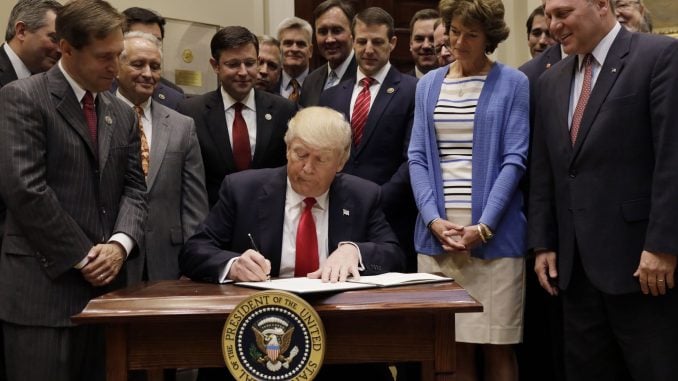
WASHINGTON, D.C. North Carolina is one of the states that could benefit most from a new executive order from the Trump administration intended to expand offshore energy production, according to the N.C. Petroleum Council. Last week, President Donald Trump signed the America First Offshore Energy Strategy executive order, which directs the U.S. Department of Interior to review and replace the Obama administration’s most recent five-year oil and gas development plan for the Atlantic Outer Continental Shelf. The Obama plan blocked energy exploration for large swaths of the Arctic and Atlantic oceans, including areas off the coast of the Carolinas. The new order directs that the secretary of the Interior review the old plan, which may include possible leasing agreements off the coast of four eastern U.S. states. Rep. Richard Hudson (R-N.C.), co-chairman of the Atlantic Offshore Energy Caucus, has been working to make the order a reality. He sent a letter to Trump in April urging him to release those Atlantic leasing sales, saying it will mean lucrative energy production jobs in eastern North Carolina.”I’ve been advocating for environmentally sound offshore exploration in the Atlantic for years,” said Hudson. “It’s about time we had a president who shares my desire to responsibly open North Carolina to energy exploration while protecting our beautiful coastal waters as well as our tourism and ocean industries.”Supporters of the move point to poll numbers that say 80 percent of American voters support increasing domestic oil and gas production.”It is better to produce energy here than be held hostage by foreign entities,” Interior Secretary Ryan Zinke told reporters in a briefing about the executive order. The order also requires Commerce Secretary Wilbur Ross to review previous presidents’ designations of marine national monuments and sanctuaries.”The Mid-Atlantic outer continental shelf off our coast is estimated to hold 2.41 billion barrels of oil and 24.63 trillion cubic feet of natural gas, which is why embracing these resources in a safe and responsible way is so important for our energy security,” said David McGowan, executive director of the North Carolina Petroleum Council. “Our state is uniquely positioned to add jobs and bring in local revenue through energy development, which can safely coexist with our current tourism and fishing industries while providing much needed diversity for our local economies.”Weeks before leaving office, President Barack Obama produced a five-year plan that banned new oil and gas drilling in federal waters in 3.8 million acres of the Atlantic and 115 million acres of the Arctic oceans. Trump had campaigned on a promise to do away with Obama-era environmental regulations that he said were hobbling energy development without providing tangible benefits, pleasing industry and enraging environmental advocates.”We’re opening it up. … Today we’re unleashing American energy and clearing the way for thousands and thousands of high-paying American energy jobs,” Trump said as he signed the order.Environmental groups, including Oceana and the Center for Biological Diversity, slammed the new executive order. Oceana was a key interest group in securing Obama’s action last year to block energy production in the Atlantic. It is vowing to fight Trump’s order in court.”President Trump is taking aim at expanding this dirty and dangerous industry into new areas like the Atlantic and Arctic oceans,” said Jacqueline Savitz with Oceana. “Let me be clear: that would be a huge, bad, stupid mistake. The president’s efforts to benefit energy producers won’t make America great again. It will simply enable corner-cutting and set us up for another havoc-wreaking environmental disaster. But this time it could be along the popular Outer Banks.”Green groups have been fighting oil exploration for decades and doubled-down on legal and lobbying efforts after an oil spill in the Gulf of Mexico seven years ago. The spill triggered the establishment of the Center for Offshore Safety that uses third-party audits to create and improve safety standards, particularly in deep-water wells. The industry says that the crisis ushered in a new era of safety measures that are unprecedented. Still, on Thursday 27 Democratic senators sent a letter to Zinke opposing the order. “Allowing drilling anywhere on the east or west coasts would threaten key economic drivers for these states such as fishing and tourism with the risk of an oil spill,” they wrote.The battle is likely to continue in N.C. and Washington as proponents hope to bring a piece of the energy industry’s 9.8 million U.S. jobs to the state, while opponents work to block mid- and south Atlantic waters from energy companies.




